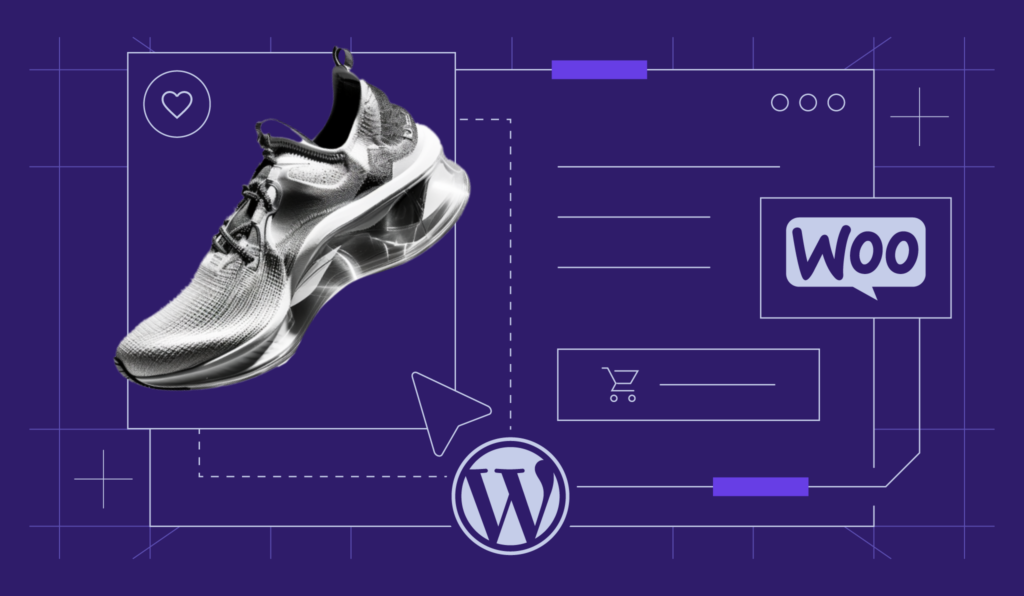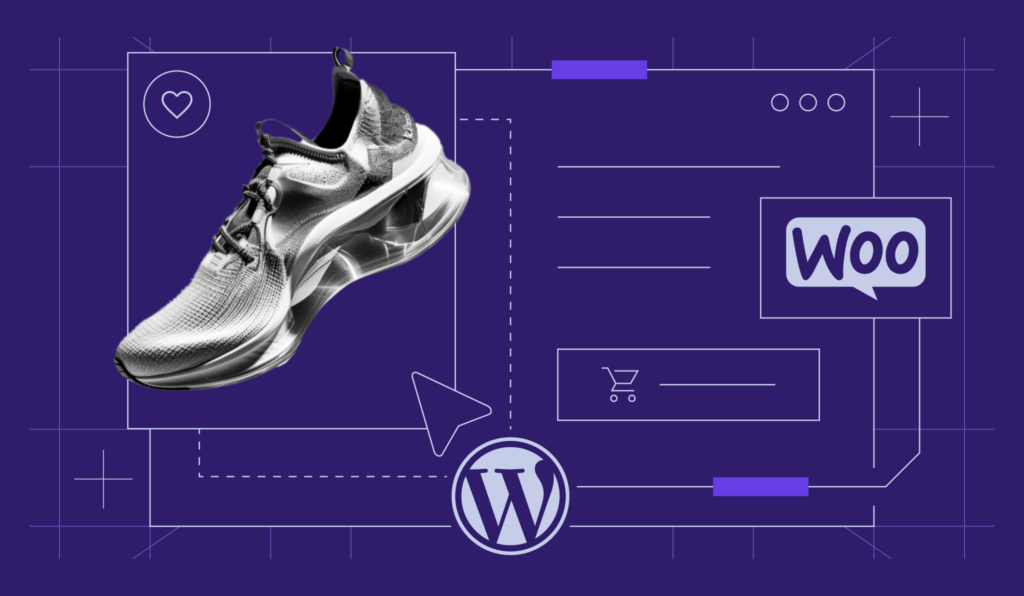How to use AI in WordPress
Numerous AI solutions are now available to streamline various tasks of website management, allowing users of all skill levels to optimize their websites and content effortlessly. And while there are plenty of ways to integrate AI into your website’s control panel, WordPress simplifies the process with plugins.
These AI plugins can improve your site with new functions, like chatbots for customer support, personalized content for SEO and user engagement, and image optimization.
This WordPress tutorial will explore eleven different ways you can use AI on your WordPress site. We will also discuss the benefits of incorporating them into your workflow.
11 ways to use AI in WordPress
This section explores common use cases where AI tools come in handy.
1. Build a website
Building a new WordPress website doesn’t require coding, but designing and adding content can still take time.
Hostinger addresses this challenge by integrating AI into the site-building process. Our AI Website Builder for WordPress, available on Managed WordPress Business and Cloud hosting plans, can help you build a website in just minutes based on your description.
The AI tool is currently optimized for building business and portfolio websites. Here’s how it works:
- Purchase any Hostinger hosting plan that includes AI Website Builder for WordPress, then follow the onboarding flow.
- Choose Portfolio or Business and services as the type of website you want to build.

- Select Create a website with AI as your preferred method.
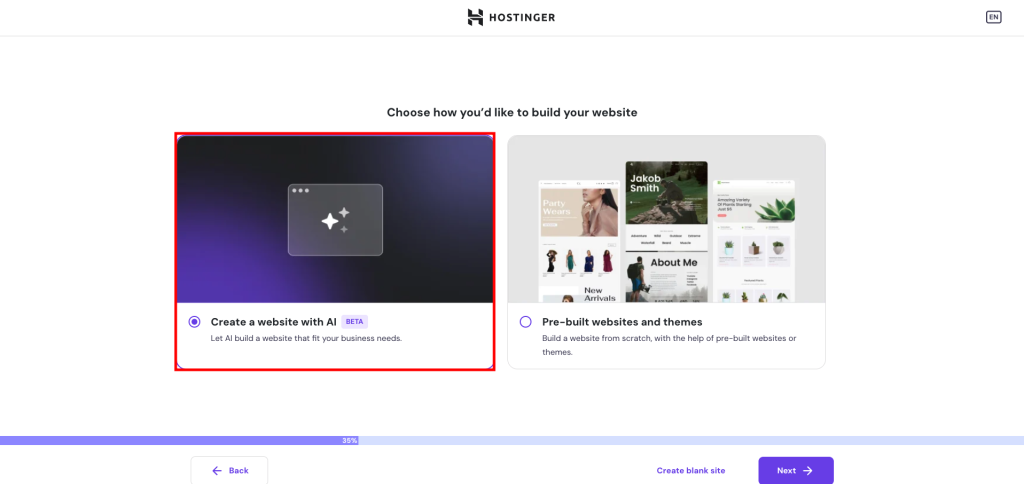
- Follow the rest of the onboarding process until you see the AI website creation form. Fill in your brand name and a brief description of the kind of website you want to build. Once you’re done, click Create. The process takes a minute or two to complete.
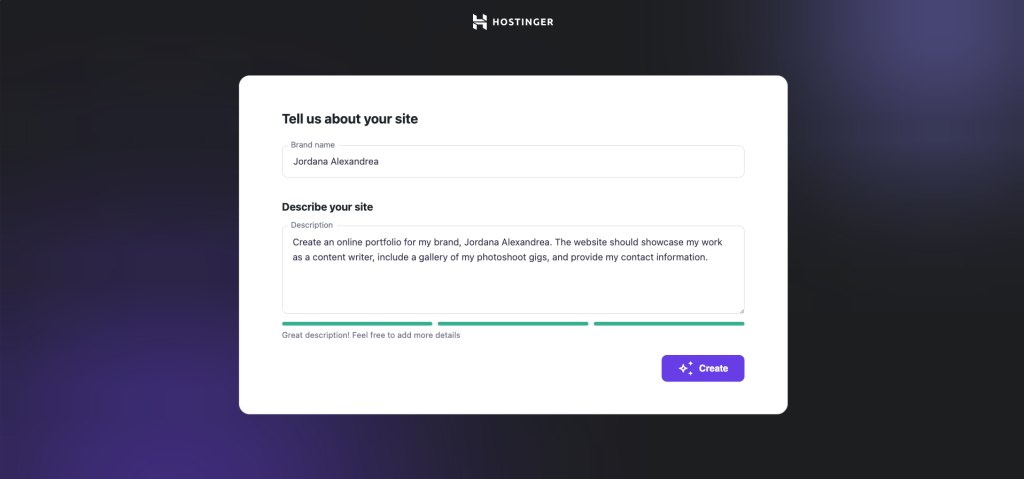
- Review the newly created website, and click Confirm and edit if you’re happy with it. Otherwise, redo the prompt by selecting Create again.
Congratulations, you’ve built your WordPress site! The tool will redirect you to the WordPress editor, where you can make final adjustments to the design and copy.

2. Create copy text and content
A regular publishing schedule is a key practice in search engine optimization (SEO). However, not all website owners can dedicate the time and resources it requires.
AI tools address this issue by simplifying the content creation process so that you do not have to spend hours doing research and writing text.
AI content creators use Natural Language Processing (NLP) to understand human language and tailor content based on your prompts. They can create website content quickly and optimize it with relevant keywords for SEO. Certain AI tools even allow for translation into multiple languages, expanding your audience reach.
Hostinger clients on any hosting plan have access to our in-house AI Content Creator plugin. Here’s how to use it:
- Navigate to the Websites section on hPanel. Click Manage next to the WordPress website you want to improve with AI.

- Scroll down to the Tips to improve section and select Install AI Assistant.

- Click WordPress overview → Admin Panel to enter your WordPress dashboard. Then, head to Hostinger → AI Content Creator on the left sidebar.

- Configure the following settings to personalize your AI-created content:
- Content type ‒ choose between creating a WordPress post or a web page.
- Tone of voice ‒ decide how you want readers to perceive the content (neutral, friendly, formal, trustworthy, or witty).
- Content length ‒ determine the content’s length.
- Describe your content idea and add relevant keywords for SEO. Click Create content once you’re ready.
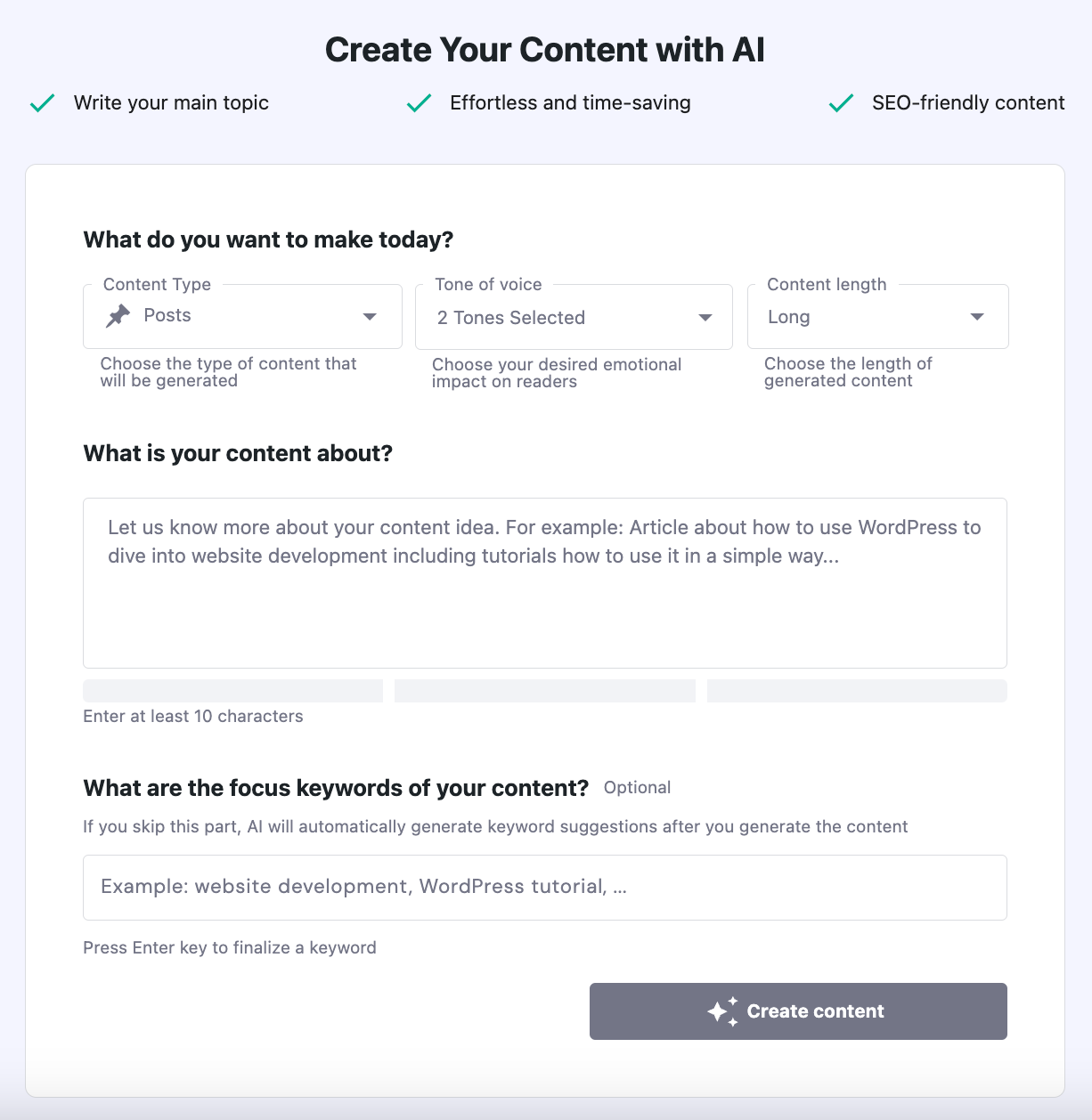
- AI Content Creator will produce the content, relevant keyword suggestions, a meta description, and an image as the featured image or part of the content. Select Publish to push the content live as it is or Edit as a draft to review it on the block editor.
For non-Hostinger users, check out our list of the best AI content generators like Jasper, GrowthBar, and Rytr to speed up your writing process.
3. Generate images and site logo
According to web design statistics, 40% of visitors favor images over other types of visual elements on business websites. Web designs and brand logos contribute to shaping first impressions and boosting conversions, making them crucial for a successful online presence.
When you can’t afford to hire a graphic designer, AI image and logo generators offer a cost-effective way to make your brand stand out. With machine learning technology, they produce unique designs inspired by various existing visual styles in seconds.
Hostinger users will get a free credit for using our AI Logo Maker. If you run out of credits, you can buy 50 more for $5.
Follow these steps to create a logo on Hostinger:
- Go to the Hostinger AI Logo Maker homepage and select Create Your Logo Now.

- Log in to your Hostinger account.
- Open the Create with AI tab, then briefly describe your brand and pick the desired style. Hit Create once you’re ready.

- After the tool has finished generating multiple options, hover over the one you like most and click Edit logo.

- Adjust the spacing, icon size, slogan, and font style as needed. Once you’re happy with how the logo looks, hit Download to save the file.

Alternatively, see our guide on creating website visuals with DALL-E, an OpenAI tool that generates images from text descriptions.
4. Improve search engine optimization
Besides helping with content production, AI can improve your SEO by automating and streamlining key tasks like keyword research and content optimization. You can even use AI tools to analyze your competitors’ SEO strategies and enhance technical SEO by monitoring page speed.
As SEO is an ongoing process, AI can save time and money by analyzing large amounts of data and identifying trends to help you make sound decisions. It’s especially helpful for WordPress website owners who are new to SEO and don’t have the budget to commission an expert.
Here are some of the best AI SEO tools we tested:
- Rank Math SEO ‒ best for on-page keyword optimization and website performance analysis.
- AIOSEO ‒ a popular WordPress plugin that can produce SEO titles, meta descriptions, and XML sitemaps to help search engine crawlers understand your website content better.
- MarketBrew ‒ forecasts pages’ search engine ranking before publishing based on Google Analytics data, keywords, and organic traffic trends.
- KeywordInsights ‒ compiles keyword ideas tailored to the chosen location and language for easier content planning.
Most AI SEO tools support integration with WordPress’ block editor. For example, Rank Math SEO analyzes your content as you write, offering suggestions to enhance its SEO and readability.

5. Troubleshoot WordPress issues
For non-technical users, AI can help identify issues within their WordPress site and recommend solutions quickly. AI tools check error logs, track website performance, and spot unusual activities that could signal problems, such as plugin conflicts and security risks.
Automating these checks with AI reduces downtime and speeds up troubleshooting, allowing you to save on developer fees while ensuring a consistent user experience.
Hostinger offers WordPress AI Troubleshooter to users on WordPress web hosting and other more advanced plans. This in-house AI feature catches errors like 403, 404, 500, 503, as well as the “There has been a critical error on your website” message, and helps you resolve them.

Other excellent AI-powered WordPress plugins for troubleshooting include Screaming Frog SEO Spider and Plugin Detective. The former crawls websites for broken links, duplicate content, and incorrect redirects, while the latter identifies and troubleshoots plugin-related issues efficiently.
6. Generate custom codes and check code quality
As coding requires precise attention to detail, AI tools can improve developers’ efficiency and work quality. Many AI-powered developer tools can generate custom codes based on specific project requirements, improve code quality, and even catch and fix errors.
You can consult your WordPress codes with AI chatbots like ChatGPT and Gemini. For specific tasks like troubleshooting and code analysis, check out these AI tools to boost productivity:
- CodeWP ‒ generates PHP, JavaScript, WooCommerce, and WordPress code snippets from simple prompts.
- Snyk ‒ analyzes codes for security vulnerabilities and license compliance issues.
- Figstack ‒ translates code functions into various human and programming languages.
- Mutable.ai ‒ automates documentation updates and forecasts potential errors to improve testing efficiency.
These AI tools often use chatbots to communicate with website visitors. For example, with CodeWP, simply pick the mode and preset as the base parameters, then describe the purpose of the code you want to generate. The process takes seconds to complete.

Did You Know?
7. Protect your website from spam
Websites with comment or review sections, contact forms, and message boards are prone to spam comments. If left unchecked, they can hurt your website’s reputation and user experience.
AI-powered spam checker plugins can save time on manual moderation. Using machine learning algorithms, they spot spam signs, like unusual phrasing and specific keywords, and adapt to new spam techniques to improve accuracy over time.
Consider using AI plugins for spam protection, such as:
- Akismet ‒ built by WordPress developers, this popular WordPress plugin has one of the largest spam databases in the industry for maximum accuracy.
- Antispam Bee ‒ a free WordPress plugin that lets you block spam comments by country and language.
- CleanTalk ‒ filters spam comments, registrations, polls, and orders for WordPress and WooCommerce websites.
AI anti-spam plugins usually have an easy setup process with customizable settings to flag or automatically delete spam content. Some tools provide detailed reports and statistics on blocked comments and users, helping website administrators track potential spam activities more efficiently.
Akismet, for example, highlights the number of flagged spam messages in the dashboard widget for easier access. See our guide on setting up Akismet for anti-spam protection.
8. Translate your website
Making your WordPress website multilingual is another effective method when improving SEO and user experience. If language barriers keep you from expanding your audience reach, AI can help with that, too.
Various AI translation plugins are ready to translate your WordPress site content into different languages in real time. They use machine learning algorithms to ensure the content’s context and tone aren’t lost in translation, making it accessible to an international audience.
TranslatePress, for example, uses AI to automate slug, gettext, and email translation. It can also generate translations for different user roles, which is one of its premium features.

Check out these top AI-powered WordPress plugins for translation:
- Weglot ‒ supports over 100 languages with an intuitive visual translation editor for previewing the website’s front-end.
- TranslatePress ‒ allows you to translate directly from the front-end and make separate translations for logged-in and visiting users.
- GTranslate ‒ supports URL translation and search engine indexing for translated pages.
- Translate WordPress ‒ developed by GTranslate developers, it can localize images and support language hosting for better local search rankings.
9. Optimize images and improve accessibility
Websites with many visuals can lose potential visitors if the images aren’t optimized and accessible. Furthermore, unoptimized images tend to load slowly, affecting your user experience and SEO
Image compression tools incorporate AI to automate the process without compromising quality. Certain WordPress AI plugins can add alt texts, adjust color contrast, and improve the brightness of images for users with visual impairments and screen reader reliance.

Here are some of the best WordPress AI plugins to optimize images:
- Smush ‒ helps with WordPress image optimization aspects like resizing, lossless and lossy compression, and automatic WebP conversion.
- Alt Text AI ‒ automatically adds alt texts for images in various languages and enables custom ChatGPT prompts to modify the produced text.
- ShortPixel ‒ allows background processing for faster bulk image optimization, which is useful for WordPress sites with an extensive media library.
- Optimole ‒ offers machine learning-powered automatic compression based on visitors’ devices.
10. Enable chatbots
For better customer support, use AI to add chatbots to your WordPress site. AI-powered chatbots can increase user engagement by offering personalized experiences. They can handle multiple conversations at once, freeing up human agents to deal with more complex issues.
From the business side, AI chatbots can help capture potential leads and provide valuable data for market research. You can scale your customer support team to offer 24/7 service without hiring more staff or increasing operational costs.

Check out these top AI chatbot tools to improve customer relationships:
- Tidio ‒ can formulate complex answers from FAQs and knowledge base resources to solve customers’ problems.
- Zendesk ‒ offers self-help options by suggesting relevant articles through various channels.
- Chatsonic ‒ comes with an AI content creator, translation capabilities, and voice command support.
- LivePerson ‒ builds custom AI-powered chatbots that integrate with back-end systems like scheduling tools and payment processing.
11. Add a voice search to your site
As more users turn to voice commands for internet searches, optimizing your WordPress website for voice search can increase its ranking for conversational queries. With NLP, AI tools analyze how users phrase questions verbally to optimize website content with relevant long-tail keywords.
For local voice searches, AI uses geographic data and user behavior to improve location-based queries. As a result, you have a better chance of ranking for local searches.
WP Fastest Site Search is one of the best WordPress plugins for voice search optimization. It offers AI-powered features to accommodate personalized search with smart semantic filtering.
After creating an account, configure the WordPress AI plugin’s indexing process and search settings. You can even set up search redirects and synonyms to improve user experience.

Want More AI Tool Options?
Check out our list of the best AI-powered WordPress plugins for improved website development and management..
AI best practices for WordPress
While AI tools offer various benefits, they also have their challenges. When adding an AI plugin to your WordPress website, follow these best practices for optimal results.
Choose reputable plugins
With well-reviewed and regularly updated WordPress plugins, you’re less likely to encounter compatibility and security issues. Moreover, trusted plugins usually have a customer team for technical support and troubleshooting.
Understand data privacy laws
AI tools often process user data to function optimally. Ensure the ones you use comply with WordPress GDPR and other data protection regulations, especially when dealing with sensitive information.
Run tests before implementation
Before adding an AI plugin to your live WordPress website, test it on a staging site. This way, you can identify any potential conflicts or errors without affecting the live site’s performance and user experience.
Check out our guide on setting up a WordPress staging environment for the setup steps and best practices.
Perform regular monitoring
While AI can do many tasks, it’s not perfect. Monitor its performance and output regularly to make sure it functions as intended.
For example, when using AI content creators, check whether the content presents accurate information and isn’t plagiarized. With AI translation tools, manually update and correct any inaccuracies in the translated text.
Prioritize user experience
Different AI tools have varying capabilities and limitations. So, only use them if they can benefit your website, users, and business goals.
For example, using an AI chatbot can improve customer support and reduce response times. However, if the chatbot can’t give helpful answers, it can affect their experience.
Similarly, with AI-created content, consider whether it reads naturally and follows the best WordPress SEO practices. Poorly written or irrelevant content can deter visitors and hurt your site’s reputation.
Conclusion
AI has greatly impacted many sectors, including content development and website optimization. With WordPress, users can easily integrate the technology to automate and streamline tedious tasks by installing AI-powered plugins.
Let’s recap the benefits of using AI for WordPress websites:
- Simplify website building.
- Speed up content production.
- Generate unique visual elements.
- Enhance SEO efforts.
- Ease troubleshooting.
- Streamline coding and debugging.
- Automate spam filtering.
- Speed up content translation.
- Optimize images and website for accessibility.
- Scale support for better customer experience.
- Optimize the website for voice search.
We hope this article helped you understand how to use AI to improve your WordPress website. If you have any questions, check out the FAQ section or leave a comment below.
How to use AI in WordPress FAQ
Can AI write my content for me?
Yes, AI can write content for you. Tools like Hostinger’s WordPress AI Assistant plugin can create articles, blogs, and other page content based on your prompts. For optimal results, review and edit AI-created content to align with your standards and audience’s preferences.
Is it good to use AI to write your blog posts?
AI can help you brainstorm blog ideas, but remember to add your personal touch. Make sure the content meets your style and quality standards, as AI may not fully understand your brand or audience nuances.
Is AI safe to use with WordPress?
Yes, AI is safe to use on WordPress, especially with trusted plugins. Make sure all AI solutions integrated with the website comply with data privacy laws and security standards to protect your data and users.
Does WordPress have AI features?
While WordPress itself does not have AI features by default, it supports AI features via plugins and third-party apps. You can use them to streamline content creation, improve SEO, optimize images, and protect your WordPress site from spam. Developers continuously release and scale AI plugins to improve WordPress’ core functions and simplify website management for users of all skill levels.

